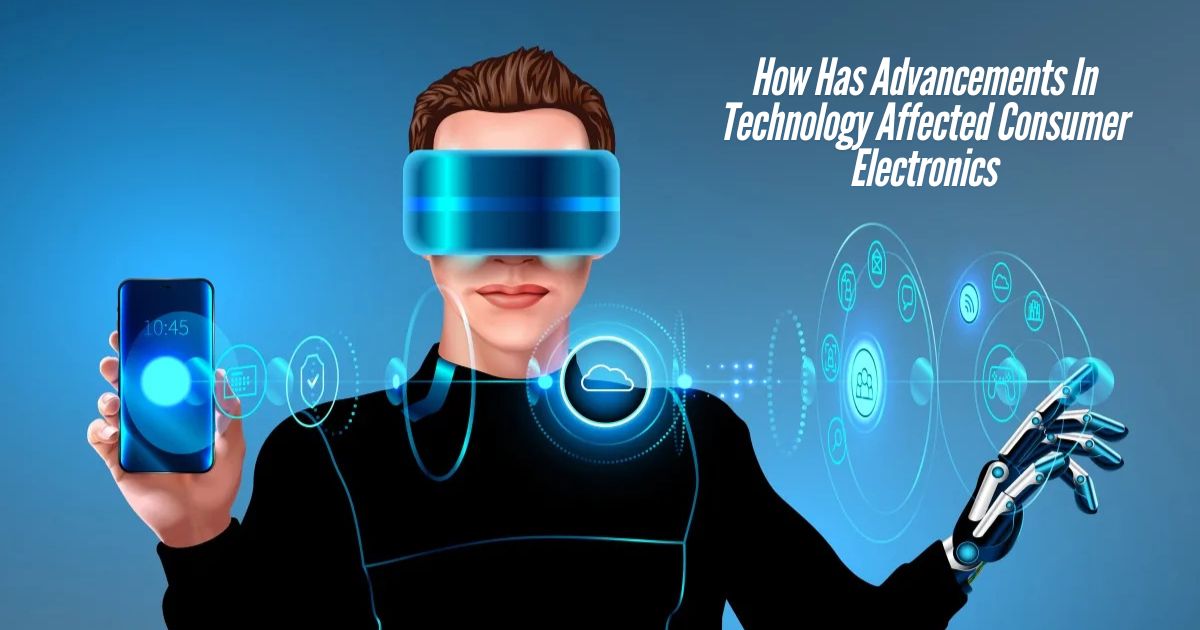Imagine a world where your television, refrigerator, and smartphone are all interconnected, seamlessly communicating to enhance your daily life. This isn’t a scene from a science fiction movie; it’s the reality shaped by rapid technological advancements in consumer electronics. Over the past few decades, we’ve witnessed a remarkable transformation in how we interact with technology, leading to smarter, more efficient, and user-friendly devices. In this article, we’ll explore how advancements in technology have affected consumer electronics, delving into the latest trends, innovations, and their impact on our daily lives.
The Evolution of Consumer Electronics
Consumer electronics have come a long way from their humble beginnings. In the early 20th century, devices like radios and televisions were groundbreaking, offering new forms of entertainment and information. Fast forward to today, and we have smartphones, smart homes, and wearable devices that not only entertain but also enhance productivity and connectivity. This evolution is driven by continuous advancements in technology, leading to more integrated and intelligent systems.
Key Takeaways
- Integration and Connectivity: Modern consumer electronics are increasingly interconnected, allowing for seamless communication between devices.
- Enhanced User Experience: Technological advancements have led to more intuitive and user-friendly interfaces, making devices easier to use.
- Energy Efficiency: Innovations have resulted in more energy-efficient devices, contributing to environmental sustainability.
- Personalization: Advancements in AI and machine learning enable devices to learn user preferences, offering personalized experiences.
Advancements in Technology Impacting Consumer Electronics
- Artificial Intelligence (AI) and Machine LearningAI has revolutionized consumer electronics by enabling devices to learn from user interactions and adapt accordingly. Smartphones now offer personalized recommendations, while smart home devices can anticipate user needs, creating a more intuitive living environment. For instance, AI-powered voice assistants like Amazon’s Alexa and Apple’s Siri have become integral parts of daily life, assisting with tasks ranging from setting reminders to controlling smart home devices.Ibertronica
- Internet of Things (IoT)The IoT has connected everyday devices to the internet, allowing them to communicate and share data. This connectivity has led to the rise of smart homes, where appliances like refrigerators, thermostats, and security systems can be controlled remotely via smartphones. For example, smart thermostats learn your schedule and adjust temperatures accordingly, enhancing comfort and energy efficiency.Wikipedia
- Augmented Reality (AR) and Virtual Reality (VR)AR and VR technologies have transformed entertainment and shopping experiences. Consumers can now try products virtually before purchasing, and immersive gaming experiences have become more realistic. The introduction of devices like the Oculus Rift has popularized VR, offering users a new dimension of interaction with digital content.Lifewire
- Energy Efficiency and SustainabilityAdvancements in technology have led to the development of energy-efficient consumer electronics. Devices are now designed to consume less power, contributing to environmental sustainability. For instance, LED televisions consume significantly less energy compared to their plasma counterparts, reducing electricity bills and carbon footprints.C2E2
- Enhanced Performance and DurabilityTechnological advancements have resulted in electronic components that offer better performance, durability, and energy efficiency. Innovations like gallium nitride (GaN) and silicon carbide (SiC) semiconductors have shown tremendous promise in power electronics, offering better energy efficiency than their traditional silicon-based counterparts. Octopart
Advantages of Technological Advancements in Consumer Electronics
- Improved Functionality: Devices are now more capable, offering features that were once unimaginable.
- Cost-Effectiveness: As technology advances, production costs decrease, making devices more affordable for consumers.
- Enhanced Connectivity: The ability to connect multiple devices has created a more integrated and efficient user experience.
- Personalized Experiences: Devices can now learn from user behavior, offering tailored experiences that meet individual needs.
Comparative Table: Traditional vs. Modern Consumer Electronics
| Feature | Traditional Devices | Modern Devices |
|---|---|---|
| Connectivity | Limited, standalone operation | Seamless integration with other devices |
| User Interface | Basic controls and buttons | Touchscreens, voice commands, AI integration |
| Energy Consumption | Higher power usage | Energy-efficient designs |
| Functionality | Single-purpose use | Multi-functional capabilities |
| Personalization | Minimal customization | Adaptive learning and customization |
User Experience in the Age of Technological Advancements
The integration of advanced technologies has significantly enhancedthe userr experience. Devices are now more intuitive, responsive, and personalized, making daily tasks more convenient and enjoyable. For example, smart home systems allow users to control lighting, temperature, and security systems remotely, providing comfort and peace of mind. Additionally, AI-powered applications offer personalized content recommendations, enhancing entertainment experiences.
Actionable Tips for Embracing Technological Advancements
- Stay Informed: Regularly update your knowledge about the latest technological trends to make informed decisions about new devices.
- Evaluate needs vs. wants: Assess whether new technologies align with your lifestyle and needs before making a purchase.
- Prioritize Security: With increased connectivity, ensure that your devices are secure by updating software and using strong passwords.
- Consider Sustainability: Opt for energy-efficient devices to reduce environmental impact and lower energy costs.
- Engage with Communities: Join forums and groups to share experiences and learn from others about the latest technological advancements.
FAQs
- How have advancements in technology affected consumer electronics?Advancements in technology have led to more interconnected, efficient, and user-friendly consumer electronics, enhancing functionality and user experience.
